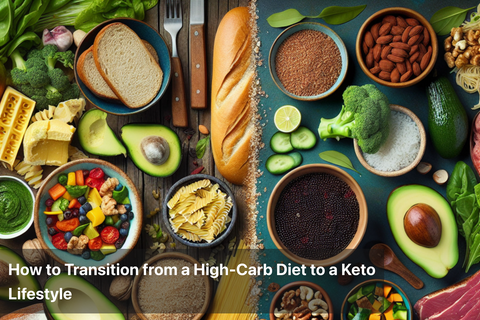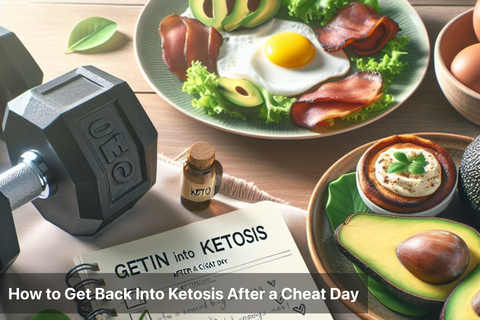
How many carbs can you consume in a keto diet?
Getting started on the keto path first means grasping the basics of this high-fat, low-carb diet and its central ideas. At its core, keto means significantly dropping your carbs while upping fats. The end goal is hitting ketosis, where your body switches gears to burning fat instead of carbs for fuel. The key factor is slashing carbs substantially.
The main concept is simple: consuming way fewer carbs pushes your body to tap its fat stores for energy needs instead. Keto requires hugely reducing sugars, starches and other carbs, so your system converts fats into ketones to power you each day. Sticking to low carbs enables reaching and staying in ketosis long-term, a metabolic sweet spot linked to many benefits.
Minimizing carb ingestion fuels keto's effectiveness. Unlike many diets that fixate on total calories, keto focuses more on nutrition sources. You specifically limit carbs, especially sugary and starchy varieties, to levels where fat becomes your body’s prime energy supply. This fundamental fuel switch unlocks the true purpose of keto eating. More soon on how to master carb management for success!

Understanding Carbs on Keto
-
Carb Restriction: The cornerstone of keto is drastically reducing carbohydrate intake to induce and maintain ketosis, where the body burns fat for energy instead of carbs.
-
Net Carbs: Calculating net carbs involves subtracting fiber and sugar alcohols (if applicable) from total carbs, as these components have minimal impact on blood sugar levels.
-
Typical Carb Intake: Most keto diets recommend consuming 20-50 grams of net carbs per day, although individual tolerance levels vary based on factors like activity level, metabolism, and health goals.
-
Sources of Carbs to Avoid: High-carb foods such as grains (e.g., rice, wheat), sugars (e.g., sucrose, fructose), starchy vegetables (e.g., potatoes), and most fruits are typically avoided or limited on keto.
-
Importance of Fiber: While total carbs are limited, fiber-rich foods like non-starchy vegetables (e.g., leafy greens, broccoli) are encouraged because they provide essential nutrients and promote digestive health without significantly impacting blood sugar.
-
Impact on Ketosis: Exceeding your carb limit can potentially kick you out of ketosis, slowing down fat burning and affecting the benefits associated with a ketogenic lifestyle.
Determining Your Carb Limit
|
Keto Diet Type |
Daily Carbohydrate Intake |
Description |
|---|---|---|
|
Strict Keto |
20-30 grams |
Ensures rapid entry into ketosis, ideal for weight loss and therapeutic purposes. |
|
Moderate Keto |
30-50 grams |
Allows for more food variety while still maintaining ketosis. |
|
Liberal Keto |
50-100 grams |
Suitable for those with higher activity levels or maintenance phases. |
-
Your age matters because as you get older, your body may not burn carbs as quickly. Knowing how your metabolism changes with age helps you adjust how many carbs you eat for the best results.
-
How active you are also matters. If you do intense workouts, you might handle more carbs than someone who doesn't move around much. Carbs become your energy source, and matching your intake to your activity level keeps your energy up without stopping ketosis.
-
Your weight goals are a big part too. If you want to lose weight, you might need to be strict with your carb limit. But if you're keeping your weight or building muscle, you might get to eat a bit more carbs.
-
To figure out your carb limit, start with the general advice of 20-50 grams of net carbs each day. Watch how your body reacts and adjust as needed.
-
Pay attention to how different carb levels affect your energy, focus, and ketone levels. This self-awareness helps you find the right balance to meet your health goals without feeling too limited.
Remember, keto is great because it can be flexible. Trying out different carb limits based on your age, activity level, and weight goals lets you create a keto plan that fits your needs and goals.
Common Keto-Friendly Carbs
Exploring keto-friendly carbs isn't just about saying "no" – it's about picking smart and healthy options. Here's a quick guide to some easy low-carb choices that can smoothly fit into your keto routine.
-
Leafy Greens: Think spinach, kale, and lettuce. These veggies are packed with good stuff and have very few carbs. Adding them to your meals not only gives you important vitamins but also keeps your carb count low – a must for keto fans.
-
Crunchy Veggies: Broccoli and cauliflower are low in carbs and high in fiber. They fill you up without pushing you over your carb limit. Great for making your meals more satisfying.
-
Berry Treats: Enjoy strawberries and blueberries. They're not heavy on carbs and bring lots of antioxidants. Satisfy your sweet tooth without getting off the keto track.
-
Nutty Snacks: Grab some almonds and chia seeds. They're crunchy, satisfying, and fit perfectly into your keto plan. Plus, they're packed with good fats and important nutrients.
-
Protein Picks: Go for lean meats, eggs, and fatty fish. They give you the protein your body needs without loading you up on carbs. Good for keeping muscles strong and feeling full.
-
Healthy Fats: Pick avocados and olive oil. They make your meals tasty and support the high-fat part of your keto diet. Full of nutrients and good for your overall health.
Remember, the trick is to choose whole foods that are rich in nutrients and fit your carb goals. By making smart choices, you not only stay on the keto path but also give your body the essential stuff it needs to stay healthy. It's not just about saying "no" – it's about finding a balanced, doable, and nourishing way through your keto journey.

Keto Diet: How Many Carbs Are Allowed?
Finding your carb limit means considering these factors and adjusting as needed. It's important to experiment, pay attention to how your body reacts, and discover the right amount of carbs for you. We've also learned that when it comes to keto-friendly foods, it's not just about limiting yourself; it's about making smart and healthy choices. Go for nutrient-rich whole foods to support your health goals while sticking to your carb limit.
As you start or continue your keto journey, keep in mind the many benefits of managing your carb intake. Besides reaching and maintaining ketosis, you're giving your body the foundation for more energy, clear thinking, and overall well-being.
In a nutshell, keto isn't a strict set of rules but a flexible guide that adjusts to you. It's about finding a balance where controlled carb intake brings you positive results. So, enjoy the process, discover your carb balance, and see how keto can transform your health goals.
This Blog post is an initiative by Lo! Foods, to provide accurate and Nutritionist / Doctor approved information related to Health. Lo! Foods is India's leading brand for Everyday Functional Foods. Foods designed for specific Health conditions or Needs. Lo! Foods also runs India's largest range of Low Carb Healthy Cloud Kitchens, under the brand names of Lo!, ProteinChef, ATH (All Things Healthy) and DiabeSmart.













Leave a comment
Your email address will not be published.